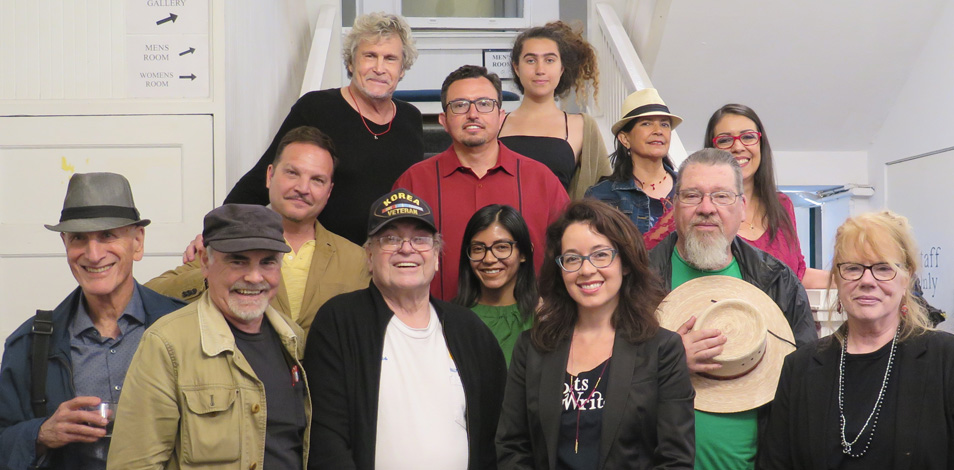Readings & Workshops (West) director Jamie Asaye FitzGerald writes about Poets & Writers’ eighth annual Los Angeles Connecting Cultures Reading held at Beyond Baroque Literary Arts Center.
For the past eight years in California, Poets & Writers has held the Connecting Cultures Reading at Beyond Baroque Literary Art Center in Venice. The event brings together organizations that serve diverse populations and have received support via our Readings & Workshops program.
For this year’s event, which took place on June 28, we invited five organizations: 826LA, a nonprofit dedicated to supporting students ages six to eighteen with their creative and expository writing skills; Beyond Baroque, dedicated to expanding the public’s knowledge of poetry, literature, and art; QueerWise, a LGBTQ writing collective and spoken word performance group; Returning Soldiers Speak, a venue for soldiers and veterans to tell their stories; and Uptown Word & Arts, which facilitates free public and private creative writing workshops and other events.
All of the groups involved do important work. Sometimes they’ve heard of each other already, sometimes they discover one another at the reading event itself. It’s wonderful to see them getting to know each other, and the net of support that manifests as they feel buoyed in what they do by witnessing others who have a similar mission.
Each organization chooses two writers to represent them at the event. The diversity of voices at the reading is always astonishing and a testament to the importance of having as many stories as possible heard. This is always true but perhaps even more urgent in our current social and political climate.
The value of a story is best understood in listening and witnessing together—something we don’t often get to do. Events like this provide the opportunity to listen and witness. It’s much different than the canned stuff we’re exposed to in our daily lives—political rhetoric, spin, and words with weird agendas behind them. This is the stuff of the personal, still often political, but stories that come from the people at the most fundamental and profound level.
Robert Rosenstone from Beyond Baroque read “Brisket for Ramadan,” a witty prose piece recounting the cross-cultural experience of being a Jewish man married to a Muslim woman. Poet RD Armstrong reminded us that “a poem can be everything and nothing.” Alejandra Castillo from 826LA read a powerful poem inspired by her mother’s stories of crossing the border:
Y pasábamos corriendo por el cerro like our feet were on fire,
como Cuauhtémoc. Como dos horas corriendo with blisters popping
here and there like bubble wrap. And if you didn’t run, te dejaban.
We left three behind in the purgatory between México y el otro lado.
Y ahí se quedaban.
The cracks on this desert
swallow bodies whole. Ni de gringos ni de indios. No man’s land.
Teen writer Ashla Chavez Razzano, participating on behalf of 826LA for her second time at this event, read a musical poem of “sweat soft as water.” Michael Kearns from QueerWise chilled us with the motif of children kept in cages, while Dave Trudell warmed us back up with memories of going to the drive-in where he worshipped femme fatale screen actresses like Ava Gardner and Lee Grant. Leilani Squire from Returning Soldiers Speak brought to the event reflections on her work with veterans, and Les Probst read about his own memories of being drafted for the “forgotten” Korean War. Uptown Word & Arts poet Aurelio Alba compared the process of editing to changing diapers and Cynthia Duran, in her first public reading ever, closed the night out with a laugh-out-loud story about being held up at gunpoint while working at a Big 5 Sporting Goods store.
While Poets & Writers works with and knows well each of the organizations we invite to curate this event, we are not always familiar with the writers they invite. Each year holds a wonderful surprise for us, and for the rest of the audience. We never know quite how all the stories will fit together, but they always do.
Thank you to Beyond Baroque for hosting this event, and to all of the presenting organizations and readers for making this another memorable reading.

Support for this event was provided, in part, by Poets & Writers thanks to a gift from Diana Raab. Additional support for Readings & Workshops in California is provided by the California Arts Council, a state agency, and the National Endowment for the Arts, a federal agency, and by the Friends of Poets & Writers.
Photo: 2018 Los Angeles Connecting Cultures readers and curators (Credit: Brandi Spaethe).






